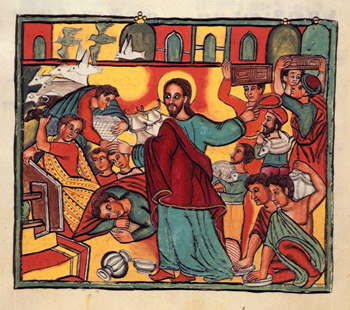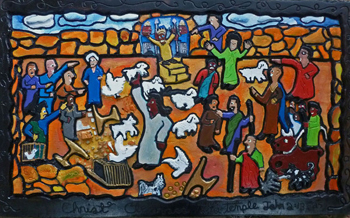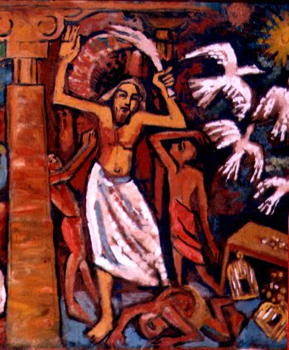Feeling Nervous About Meeting Jesus
By Dan Clendenin
For Sunday March 8, 2015
Third Sunday in Lent
Lectionary Readings (Revised Common Lectionary, Year B)
Exodus 20:1–17
Psalm 19
1 Corinthians 1:18–25
John 2:13–22
I've spent the last forty years reading and writing about Jesus. Studying Jesus. Worshipping Jesus. Following Jesus. Or at least trying to, as best I can.
One consequence of all my earnest effort, though, is that I've become a bit too familiar with my subject matter. So familiar that I sometimes put Jesus into a nice-n-neat little box. From there, it isn't hard to fall into Donald McCullough calls "the dangerous illusion of a manageable deity."
John's story about Jesus cleansing the temple warns me about domesticating the deity.
 |
Jesus cleanses the temple, 17th-century Ethiopian. |
Some people say that if we could just get behind the "Christ of faith" and discover the "Jesus of history," we'd understand him more. I think the historian Garry Wills is right on this point — if we discovered the historical Jesus, he'd actually seem more rather than less mysterious to us. He'd look more like the epistle for this week: "to the Jews a stumbling block and to the Greeks a laughing stock."
We're all inclined to create Jesus in our own image. Thomas Jefferson's scissored-down Jesus was a mild-mannered moralizer guaranteed not to offend Enlightenment rationalism. Warner Sallman's portrait of Jesus — a gentle fellow with flowing blond hair and saccharine blue eyes — looks like he wouldn't hurt a flea.
The "cleansing" of the temple is a delicate euphemism for the only violent act of Jesus that's recorded in the gospels (were there others left unrecorded?). The story was important enough to the early church that all four gospel writers included it. It echoes those other scriptural sound bites in the gospel where people were afraid after seeing Jesus heal someone, where his detractors were afraid to ask him any more questions, and where some disciples were so offended by Jesus that they quit following him. The cleansing of the temple reminds me that there's no "business as usual" with Jesus.
As an observant Jew, Jesus would have joined the 300,000 people who had crammed into Jerusalem to celebrate the Passover feast. At that time, the temple building constituted the essence of Jewish faith in both literal and symbolic ways. It was a bustling nexus of commercial activity, crowds of worshippers, nationalist aspirations, political identity, historical memory, architectural splendor, and of religious affiliation.
In the temple, Jesus encountered people selling animals to the pilgrims who needed them to make their obligatory sacrifices. He met the money changers, too, for worshippers also needed to exchange their Roman currency into Jewish money in order to pay the temple tax in the coinage of the "sanctuary shekel."
 |
Jesus cleansing the temple by Carl Dixon, mixed media on sculpted wood panel. |
At some point, as Jesus encountered all this religiously-oriented "business," he lost it and all hell broke loose. Incensed at the sacrilege of it all, Jesus improvised a whip, thrashed the animals from the temple, scattered the coffers of the money changers, and overturned their tables: "How dare you turn my Father's house into a market!" he screamed. Later his disciples would remember Psalm 69:9 and attach a sense of prophetic fulfillment to this startling event: "Zeal for your house will consume me."
What was Jesus thinking as he wreaked such havoc in the temple that day? Maybe he objected to any and all commercial activity in the temple, even honest transactions that were necessary for pilgrims to fulfill their religious obligations. Or maybe he detested the exploitation and avarice of the religious authorities who controlled all access to ritual purity.
Whatever the case, Jesus didn't stop there. Things got even stranger. Jesus followed his violent act with an enigmatic saying. When asked to justify himself, Jesus refused; instead of any justification or explanation, he said, "Destroy this temple, and I will raise it again in three days." Long after the event, his disciples interpreted this dark saying as a prediction of his death and resurrection.
What do this violent act and dark saying mean? Some people see a prophetic prediction of the destruction of the temple that occurred in 70 AD. A simpler interpretation focuses on the purification of the temple to its sacred purpose, as a place of prayer for all people, without manipulation or exploitation by the religious gatekeepers. A third nuance suggests that it is in Jesus's own body, and not in the temple building, that we meet God.
The disciples must have tossed and turned a sleepless night after all that craziness. They must have found it terribly disconcerting to witness Jesus unhinged, throwing furniture, shouting at the top of his lungs, and flinging money into the air. Perhaps they ran for cover with the crowd. I would have. Did they look him in the eye the next morning, or shuffle their feet, stare at the ground, and make small talk?
The next day the religious leaders confronted Jesus in those same temple courts: "By what authority are you doing these things?" It's an honest question. We shouldn't be too hard on the religious bureaucrats. They were doing their job, keeping the peace, trying to determine what had happened in order to maintain the status quo. It was natural for authorities to question a boundary-breaker like Jesus.
But just as he had the previous day, Jesus answered their question with his own question: was John's baptism truly divine or merely human? This trapped the temple teachers. If they said it was merely human, they feared reprisals from the adoring crowds. And if they admitted that John's baptism was from God, then they had no excuse for not accepting it and repenting. They were caught between fear and disobedience.
Because they didn't answer Jesus' question, he didn't answer theirs, either: "Neither will I tell you by what authority I do these things."
 |
Jesus cleanses the temple by Jyoti Art Ashram. |
And neither does Jesus answer all of my questions today, many of which are good and honest questions. Why did my mother suffer twenty years of clinical depression? Why do religious zealots burn people alive in cages? Why do millions of children die from drinking dirty water?
Instead of answering questions, Jesus tells a story. A lazy son refused to work but then changed his mind and obeyed his father's request. His brother did the opposite: he promised to work but then didn't.
Jesus compared the temple authorities to the latter son. They made bold claims but did little. Tax collectors and prostitutes, said Jesus, entered the kingdom of God before them, for they promised nothing but nevertheless believed John's message of invitation and indictment.
In The Lion, the Witch, and the Wardrobe, CS Lewis reminds us that the divine-human struggle is neither tidy nor tame, but it is nonetheless one that we can live with confidence. Susan and Lucy ask Mr. and Mrs. Beaver to describe Aslan (Lewis's representation of Jesus). They ask if Aslan is a man. Mr. Beaver replies.
"Aslan a man? Certainly not. I tell you he is the King of the wood and the son of the great Emperor-beyond-the Sea. Don't you know who is the King of Beasts? Aslan is a lion — the Lion, the great Lion."
"Ooh!" said Susan. "I'd thought he was a man. Is he — quite safe? I shall feel rather nervous about meeting a lion."
"That you will, dearie, and make no mistake," said Mrs. Beaver, "if there's anyone who can appear before Aslan without their knees knocking, they're either braver than most or else just silly."
"Then he isn't safe?" said Lucy.
"Safe?" said Mr. Beaver. "Don't you hear what Mrs. Beaver tells you? Who said anything about being safe? 'Course he isn't safe. But he's good. He's the King, I tell you."
The cleansing of the temple is a stark warning against every false sense of security — against every nice-n-neat box I try to stick Jesus into for my own comfort. Jesus comes to challenge rather than to reinforce my prejudices and illusions. He comes to defamiliarize what religion makes safe and cozy. He never once says, "understand me." He says something far more radical. "Follow me."
Image credits: (1) ArtBible.net; (2) SacredArtPilgrim.com; and (3) frchito.net.





